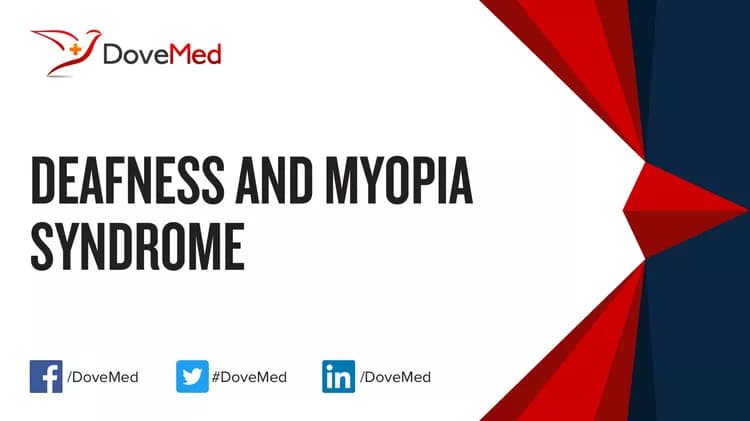What are the other Names for this Condition? (Also known as/Synonyms)
- High Myopia-Sensorineural Deafness Syndrome
What is Deafness and Myopia Syndrome? (Definition/Background Information)
- Deafness and Myopia Syndrome is a rare condition that affects both hearing and vision
- Beginning at birth or in early infancy, people with this condition have moderate to profound hearing loss in both ears that generally becomes worse over time
- Affected people also develop severe myopia (nearsightedness) later in infancy or early childhood
- Deafness and Myopia Syndrome is caused by changes (mutations) in the SLITRK6 gene and is inherited in an autosomal recessive manner
- Treatment aims to improve hearing loss and correct myopia. Cochlear implantation may be an option for some affected people
(Source: Deafness and Myopia Syndrome; Genetic and Rare Disease Information Center (GARD) of National Center for Advancing Translational Science (NCATS), USA.)
Who gets Deafness and Myopia Syndrome? (Age and Sex Distribution)
- Deafness and Myopia Syndrome is a rare congenital disorder, with very few affected families reported in the scientific literature
- The presentation of symptoms may occur at birth or early in infancy
- Both males and females may be affected
- Worldwide, individuals of all racial and ethnic groups may be affected
What are the Risk Factors for Deafness and Myopia Syndrome? (Predisposing Factors)
- A positive family history may be an important risk factor, since Deafness and Myopia Syndrome can be inherited
- Currently, no other risk factors have been clearly identified for the syndrome
It is important to note that having a risk factor does not mean that one will get the condition. A risk factor increases one’s chances of getting a condition compared to an individual without the risk factors. Some risk factors are more important than others.
Also, not having a risk factor does not mean that an individual will not get the condition. It is always important to discuss the effect of risk factors with your healthcare provider.
What are the Causes of Deafness and Myopia Syndrome? (Etiology)
- Deafness and Myopia Syndrome is caused by mutation(s) in the SLITRK6 gene. This gene codes for a protein found predominantly in the inner ear and eyes
- SLITRK6 gene mutation(s) causing Deafness and Myopia Syndrome are inherited in an autosomal recessive manner
Autosomal recessive type of inheritance: Autosomal recessive conditions are traits or disorders that occur when two copies of an abnormal gene have been inherited on a non-sex chromosome. If both parents have an autosomal recessive condition, there is a 100% likelihood of passing on the mutated genes to their children. If, however, only one mutant copy of the gene is inherited, the individual will be a carrier of the condition, but will not be present with any symptoms. Children born to two carriers, have a 25% chance of being homozygous dominant (unaffected), a 50% chance of being heterozygous (carrier), and a 25% chance of being homozygous recessive (affected).
What are the Signs and Symptoms of Deafness and Myopia Syndrome?
The signs and symptoms of Deafness and Myopia Syndrome may vary among affected individuals in type and severity.
- Conductive hearing impairment
- Hematuria
- High myopia
- Myopia
(Source: Deafness and Myopia Syndrome; Genetic and Rare Disease Information Center (GARD) of National Center for Advancing Translational Science (NCATS), USA.)
- In most cases, the hearing impairment develops before a child learns to speak
How is Deafness and Myopia Syndrome Diagnosed?
Deafness and Myopia Syndrome is diagnosed on the basis of the following information:
- Complete physical examination
- Thorough medical history evaluation
- Assessment of signs and symptoms
- Laboratory tests
- Imaging studies
- Biopsy studies, if necessary
- Molecular genetic testing to check for or confirm SLITRK6 gene mutations
Many clinical conditions may have similar signs and symptoms. Your healthcare provider may perform additional tests to rule out other clinical conditions to arrive at a definitive diagnosis.
What are the possible Complications of Deafness and Myopia Syndrome?
The complications of Deafness and Myopia Syndrome may include:
- Profound hearing loss
- Progressive deterioration of vision acuity
Complications may occur with or without treatment, and in some cases, due to treatment also.
How is Deafness and Myopia Syndrome Treated?
There is no cure for Deafness and Myopia Syndrome, since it is a genetic condition. The treatment is usually given to manage the signs and symptoms and any complication that develops, and may include:
- Corrective lenses for improving vision
- Hearing aids for deafness
- Cochlear implants to help improve hearing impairment
How can Deafness and Myopia Syndrome be Prevented?
Deafness and Myopia Syndrome may not be preventable, since it is a genetic disorder.
- Genetic testing of the expecting parents (and related family members) and prenatal diagnosis (molecular testing of the fetus during pregnancy), if available, may help in understanding the risks better during pregnancy
- If there is a family history of the condition, then genetic counseling will help assess risks, before planning for a child
- Active research is currently being performed to explore the possibilities for treatment and prevention of inherited and acquired genetic disorders
- Regular medical screening at periodic intervals with tests and physical examinations are recommended
What is the Prognosis of Deafness and Myopia Syndrome ? (Outcomes/Resolutions)
- The prognosis of Deafness and Myopia Syndrome is dependent upon the severity of the signs and symptoms and associated complications, if any
- Individuals with mild conditions have better prognosis than those with severe symptoms and complications
- Typically, the prognosis may be assessed on a case-by-case basis
Additional and Relevant Useful Information for Deafness and Myopia Syndrome:
The following DoveMed website link is a useful resource for additional information:
Related Articles
Test Your Knowledge
Asked by users
Related Centers
Related Specialties
Related Physicians
Related Procedures
Related Resources
Join DoveHubs
and connect with fellow professionals


0 Comments
Please log in to post a comment.